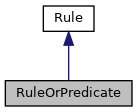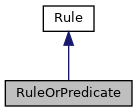Simplify predication constructions involving the INT_OR operator. More...
#include <condexe.hh>
Inheritance diagram for RuleOrPredicate:

Collaboration diagram for RuleOrPredicate:

Public Member Functions | |
| virtual Rule * | clone (const ActionGroupList &grouplist) const |
| Clone the Rule. More... | |
| virtual void | getOpList (vector< uint4 > &oplist) const |
| List of op codes this rule operates on. More... | |
| virtual int4 | applyOp (PcodeOp *op, Funcdata &data) |
| Attempt to apply this Rule. More... | |
 Public Member Functions inherited from Rule Public Member Functions inherited from Rule | |
| Rule (const string &g, uint4 fl, const string &nm) | |
| Construct given group, properties name. More... | |
| bool | checkActionBreak (void) |
| Check if an action breakpoint is turned on. More... | |
| virtual void | reset (Funcdata &data) |
| Reset this Rule. More... | |
| virtual void | resetStats (void) |
| Reset Rule statistics. More... | |
| virtual void | printStatistics (ostream &s) const |
| Print statistics for this Rule. More... | |
Additional Inherited Members | |
 Public Types inherited from Rule Public Types inherited from Rule | |
| enum | typeflags { type_disable = 1, rule_debug = 2, warnings_on = 4, warnings_given = 8 } |
| Properties associated with a Rule. More... | |
Detailed Description
Simplify predication constructions involving the INT_OR operator.
In this form of predication, two variables are set based on a condition and then ORed together. Both variables may be set to zero, or to some other value, based on the condition and the zero values are such that at least one of the variables is zero.
tmp1 = cond ? val1 : 0;
tmp2 = cond ? 0 : val2;
result = tmp1 | tmp2;
The RuleOrPredicate simplifies this to
if (cond) result = val1; else result = val2;
or to be precise
newtmp = val1 ? val2; // Using a new MULTIEQUAL
result = newtmp;
In an alternate form we have
tmp1 = (val2 == 0) ? val1 : 0
result = tmp1 | val2;
again, one of val1 or val2 must be zero, so this gets replaced with
tmp1 = val1 ? val2
result = tmp1
Member Function Documentation
◆ applyOp()
◆ clone()
|
inlinevirtual |
◆ getOpList()
|
virtual |
The documentation for this class was generated from the following files:
- condexe.hh
- condexe.cc
 1.8.17
1.8.17